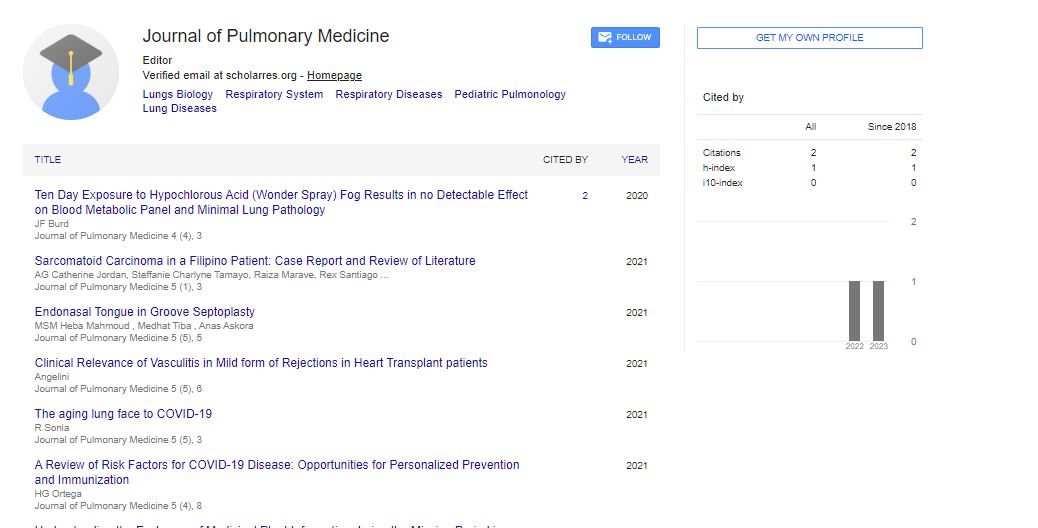Editorial, J Pulm Med Vol: 5 Issue: 1
COVID-19 Vaccination and Ethics
Rateesh Sareen*
Pathology Department, Memorial Hospital and Research Center, Jaipur, India
*Corresponding Author: Rateesh Sareen Pathology Department, Memorial Hospital and Research Center, Jaipur, India E-mail: drrateeshsareen@yahoo.co.in
Received Date: 05 February, 2021; Accepted Date: 19 February, 2021; 26 February, 2020
Abstract
SARS COV-19 pandemic has shaken the medical, political and social systems globally affecting nearly entire human race with lockdowns, social distancing and numerous restrictions. Till date effective treatment against SARS COV-2 is lacking and there is resurgence of COVID- 19 in various parts of the world. The current focus is on vaccination against COVID-19 infection, every government trying their level best to provide vaccines to front line health care workers, others like police entrusted with law and order and elderly population respectively. Some incidents of adverse reaction to vaccines have been reported from various countries with skepticism about their efficacy and safety as the vaccines has been developed in short time with limited availability of data on safety and efficacy. The regulatory bodies have given nod to emergency authorization use and enthusiastically inoculated doses to health care workers. The big question is of free informed consent of health care workers for vaccination, is it without coercion, without peer pressure or pressure from higher authorities as many of vaccines have not cleared the complete process of clinical trials for the sake of immediate availability of vaccine. Could the standard protocols for vaccine development be flexed as per need, if so then why we take years developing vaccine for other diseases or are they driven by demand and supply proportions. These are some questions which will be addressed in due course of time once we get over the pandemic.
Keywords: COVID-19
Editorial
SARS COV-19 pandemic has shaken the medical, political and social systems globally affecting nearly entire human race with lockdowns, social distancing and numerous restrictions. Till date effective treatment against SARS COV-2 is lacking and there is resurgence of COVID- 19 in various parts of the world. The current focus is on vaccination against COVID-19 infection, every government trying their level best to provide vaccines to front line health care workers, others like police entrusted with law and order and elderly population respectively. Some incidents of adverse reaction to vaccines have been reported from various countries with skepticism about their efficacy and safety as the vaccines has been developed in short time with limited availability of data on safety and efficacy. The regulatory bodies have given nod to emergency authorization use and enthusiastically inoculated doses to health care workers. The big question is of free informed consent of health care workers for vaccination, is it without coercion, without peer pressure or pressure from higher authorities as many of vaccines have not cleared the complete process of clinical trials for the sake of immediate availability of vaccine. Could the standard protocols for vaccine development be flexed as per need, if so then why we take years developing vaccine for other diseases or are they driven by demand and supply proportions. These are some questions which will be addressed in due course of time once we get over the pandemic.
The Nuremberg code was the first international document for ethical conduct of biomedical research. The code clearly specified voluntary consent as the prime requisite for inclusion of participants in clinical trials. The concept of voluntary free consent for participation has been enunciated in various international instruments like those from World Medical association (1964), Helsinki declaration, and CIOMS guidelines 1982 and in India by ICMR-2002 guidelines. The conceptual ground of these guidelines vests with Belmont report issued by the National commission for biomedical and behavioral research which focuses on three principles autonomy, beneficence and justice. Autonomy refers to deliberation about personal choices, with protection of vulnerable groups against harm or abuse. Ethical obligation to maximize benefits and minimize harm is referred as beneficence. Justice refers to ethical obligation to treat each person in accordance with what is morally right and proper and to give each person what is due to him or her.
We are well aware that in clinical trials patients are subjected to untested new treatment and are expressed to unknown risks. The guidelines make it mandatory to obtain free and informed consent by participants. Free consent is the one that is not being procured by fraud, misrepresentation or coercion. Absence of inducement is must for free consent. Informed consent means informing the prospective participant of objectives, nature of research, protocol, effects of drug and probable risks. The million dollar question is that in developing countries with rampant illiteracy, ignorance is the consent so obtained is genuinely free and informed. Could the self-interest of political governance of the country for effective COVID-19 control make them persuasive?
The medical profession has to bear the intellectual and moral burden of perseverance of medical ethics which are regarded as an unwritten code of conduct without sanctions and a person who fails its standards is considered unworthy of the profession. Therefore, offering vaccine for them being front line workers is definitely a win situation for establishments but do they compromise the concept of free informed consent where the consenting process is no more less than a ritualistic nod of obeisance to ethical norms for we are facing a pandemic.
It calls for introspection at all levels as our professionals need more security, support and care at all times not only in pandemic and should not be made guinea pigs for fulfilling whims and fancies of governments worldwide.
 Spanish
Spanish  Chinese
Chinese  Russian
Russian  German
German  French
French  Japanese
Japanese  Portuguese
Portuguese  Hindi
Hindi 